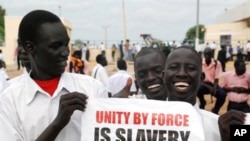The U.N. Security Council has arrived in the Darfur region of Sudan as part of a tour through the country before its scheduled January referendum. Sudan's army says it attacked rebel positions in the Darfur region just hours before the U.N. delegation arrived. A rebel spokesman confirmed the attack but denied the rebels had been ousted from their positions. Before arriving in Darfur, the council met in Juba with South Sudan President Salva Kiir, who assured them the south would not withdraw unilaterally from the north if the referendum is delayed.
The council did not receive a warm welcome in Darfur where hundreds of pro-government demonstrators and supporters of President Omar Hassan al-Bashir chanted their support for the president.
Mr. Bashir has been indicted by the International Criminal Court in The Hague on charges of war crimes and crimes against humanity for atrocities committed in this part of the Sudan.
The council has come to Darfur to express its concern about the continued and increased violence. They also hope to show their support for the Darfur peace process and urge all parties to join those talks.
The 15-member Security Council will have briefings at the U.N.-African Union Mission, known as UNAMID, which has more than 22,000 peacekeepers operating in Darfur. The council will also visit a camp for internally displaced persons, as well as meet with local officials.
But before arriving in Darfur, the council spent the night in Juba, the capital of south Sudan, where they met President Salva Kiir and many of his ministers. British Ambassador Mark Lyall Grant told reporters the discussions lasted about two hours and were very "frank and candid."
"He set out quite a powerful case for why the referendum had to go ahead on time and the fact that he felt that referendum would end up in a vote for separation; that he was not going to be declaring UDI [unilateral declaration of independence], but that if there was a delay - a politically induced delay by the NCP [National Congress Party] for the referendum, then it might be necessary for the south to hold their own referendum - go ahead with the referendum in any event," Grant said.
The council has carried with it a united message the referendum must be free, fair and credible, and that the outcome must be respected.
On January 9, in addition to the north-south referendum there is also a vote scheduled for the people of the oil-rich Abyei region to decide whether they will join the north or south. But talks in Addis Ababa to sort out pre-referendum issues are continuing.
The United States is pressing both sides to reach an agreement that would allow Abyei to decide whether it wants to join the north or south.
Before leaving south Sudan, the council visited a training center for police at Rejaf. The government hopes to train thousands of men and women to be police officers in time for the referendum, but also to provide security for what could be their new state.
On Friday the Security Council heads to Khartoum where they will meet with Foreign Minister Ali al-Kirti and other officials.
UN Security Council Visits South Sudan; Darfur




